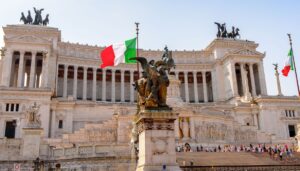Italy is renowned for its rich history, vibrant culture, and delicious cuisine, making it an attractive destination for tourists and expatriates alike. If you’re a non-EU foreigner planning to live, work, or invest in Italy, opening a bank account is a crucial step in managing your finances and accessing various services. However, choosing the right bank can be a daunting task. To help you make an informed decision, I’ve compiled a list of the top 5 banks for non-EU foreigners in Italy, along with their pros, cons, and the necessary documents to open an account.

1. UniCredit
Pros:
Extensive branch network: UniCredit is one of Italy’s largest banks, with a vast network of branches and ATMs across the country, making it convenient for account holders.
Multilingual services: UniCredit offers services in multiple languages, which can be especially beneficial for non-Italian speakers.
International presence: If you plan to do business or travel across Europe, UniCredit’s international presence can simplify your banking needs in other European countries.
Cons:
Fees: UniCredit may charge higher fees than some other banks for various services, so it’s essential to understand their fee structure before opening an account.
Documentation requirements: The bank may have strict documentation requirements, which could pose a challenge for non-EU foreigners.
Documents needed to open a UniCredit account:
- Valid passport or ID
- Residence permit (Permesso di Soggiorno)
- Proof of address in Italy
2. Intesa Sanpaolo
Pros:
Diverse account options: Intesa Sanpaolo offers a range of account types to suit various needs, including basic banking, savings, and investment accounts.
Online banking: The bank provides robust online and mobile banking services, making it easy to manage your finances remotely.
English-speaking staff: Many branches have English-speaking staff to assist non-Italian speakers.
Cons:
Limited international presence: While Intesa Sanpaolo is a significant player in Italy, its international presence is not as extensive as some other banks.
Documentation requirements: Non-EU foreigners may face stringent documentation requirements when opening an account.
Documents needed to open an Intesa Sanpaolo account:
- Valid passport or ID
- Residence permit (Permesso di Soggiorno)
- Proof of address in Italy
3. Banca Monte dei Paschi di Siena (BMPS)
Pros:
Tradition and stability: BMPS is one of Italy’s oldest banks, offering a sense of tradition and stability.
Personalized service: Smaller than some other banks, BMPS may provide more personalized service to its clients.
Online banking: The bank offers user-friendly online banking services.
Cons:
Limited international presence: BMPS primarily operates within Italy, which may not be ideal if you plan to travel extensively throughout Europe.
Documentation requirements: Non-EU foreigners may face stringent documentation requirements when opening an account.
Documents needed to open a BMPS account:
- Valid passport or ID
- Residence permit (Permesso di Soggiorno)
- Proof of address in Italy
4. BNL – Gruppo BNP Paribas
Pros:
International backing: BNL is part of the BNP Paribas Group, which is one of the largest banking groups in the world, offering a sense of international security.
Online services: BNL provides a wide range of online banking services, making it easy to manage your accounts remotely.
Multilingual support: The bank offers services in multiple languages.
Cons:
Fees: BNL may charge fees for certain account activities, so it’s essential to understand their fee structure.
Limited branch network outside major cities: While BNL has a strong presence in major cities, its branch network is more limited in rural areas.
Documents needed to open a BNL account:
- Valid passport or ID
- Residence permit (Permesso di Soggiorno)
- Proof of address in Italy
5. FinecoBank
Pros:
Online bank: FinecoBank is an online bank, which means it offers a streamlined and convenient banking experience.
Low fees: The bank is known for its competitive fee structure, making it an attractive option for cost-conscious individuals.
Multilingual support: FinecoBank provides services in multiple languages.
Cons:
Limited physical presence: FinecoBank doesn’t have a vast network of physical branches, so in-person assistance may be limited.
Documentation requirements: Non-EU foreigners may face stringent documentation requirements when opening an account.
Documents needed to open a Fineco Bank account:
- Valid passport or ID
- Residence permit (Permesso di Soggiorno)
- Proof of address in Italy
So, Which Bank Should I choose?
In conclusion, choosing the right bank in Italy as a non-EU foreigner requires careful consideration of your specific needs and priorities. Each of the listed banks offers distinct advantages and disadvantages, so it’s essential to evaluate them based on your individual circumstances. Additionally, be prepared to meet the documentation requirements, as Italian banks typically have strict identity verification processes for non-EU residents. Consulting with a local financial advisor or expatriate community can also provide valuable insights into the best banking options for your situation in Italy.



